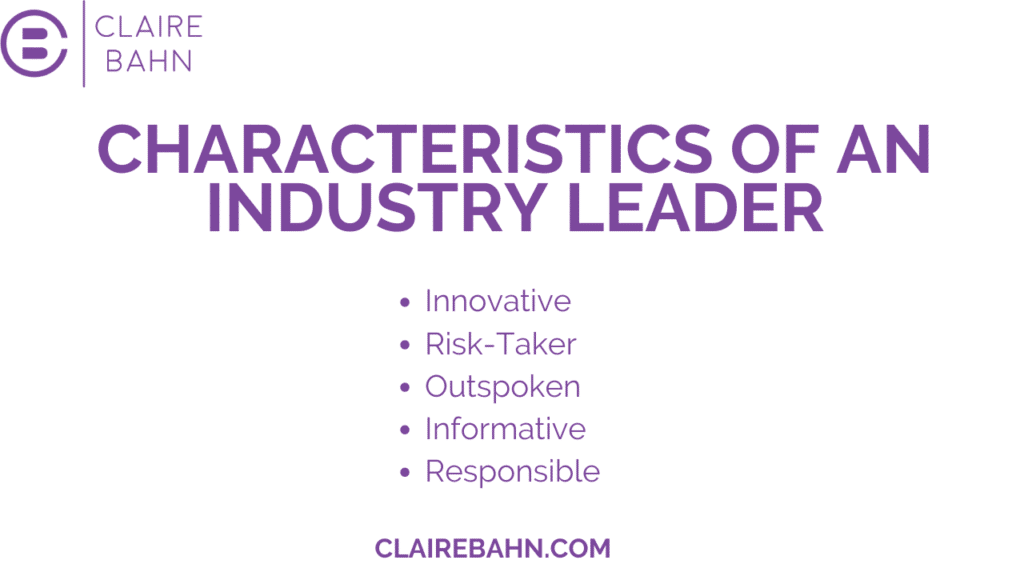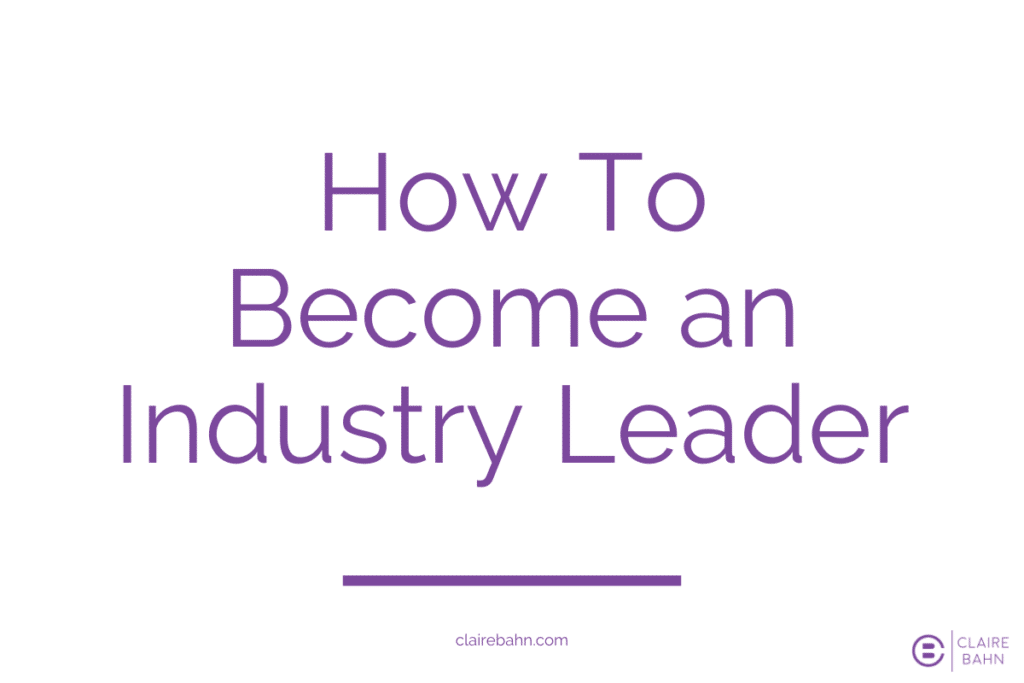Thought leader, influencer, industry “giants”— there are many terms used to describe an industry leader.
Some people come into the position by climbing the ladder (and a little bit of luck), while others make claim this title after carefully crafting their expertise.
Today, I’m going to show you how you can do a little bit of both if you want to become a leader in your industry.
RELATED: WHY DO YOU NEED A PERSONAL BRANDING CONSULTANT?
What is an Industry Leader?
You can likely recognize leaders in your industry immediately.
An industry leader stands out of the crowd within a specific niche. Industry leaders can be companies or personal brands. Some industry leader examples of a company are Apple, Amazon, and Tesla. It just so happens that the people associated with those brands (Steve Jobs, Tim Cook, Jeff Bezos, and Elon Musk) can also call themselves industry giants.
But do you need to craft a billionaire dollar corporation to become a prominent voice in your trade?
Absolutely not. Let me explain.
RELATED: THE FIRST 5 THINGS YOU SHOULD DO WHEN BUILDING YOUR BRAND
Characteristics of an Industry Leader
I’ve seen people go from no-names to online personalities in under a year. And I live in LA— the epicenter of entrepreneurship and ambition.
Out of all of the people I have in my inner circle, the ones who I’ve seen find success all share a few core characteristics. Grant Langston, the former CEO of eHarmony, had been a mentor of mine at one point in time. I instantly recognized what made him so successful. He gives direct, no-fluff advice. He always gave it to me straight, which I wholeheartedly admire in a business relationship.
My business manager’s innovation and dedication to posting informative content to her social media accounts are probably how she managed to team up with giants like Gary Vaynerchuk.
So what are the characteristics of an industry leader? Let me tell you what I’ve noticed:
Innovative
An easy way to get noticed in your line of work is to stick your neck out with (sometimes) insane ideas. It’s all about throwing ideas out there until one sticks— or until you can fine-tune a single idea to make it the best it can be.
If you’re never testing out unique concepts, you’ll never know how far you can go. If you’re only repeating the same old song and dance that we all read about over and over again, nobody is going to remember you.
Learn to be comfortable with standing out and then actually get there by pitching and testing out even the most outlandish ideas. Also, remember this: you don’t need to reinvent the wheel. Just look for new ways to get people from point A to point B faster or more comfortably.
Risk-Taker
We all know that being a full-time entrepreneur is a risk in and of itself. However, this is where a lot of could-be thought leaders fall short.
They aren’t ready to take on more risks.
When you’re just getting into the game, you probably think you’ve exhausted all your resources: you’re just getting funding, you’ve taken out a loan, you haven’t built up your clientele yet, your income isn’t inconsistent, etc.
With so much unknown, deliberately taking more risks to expand your personal brand and business is irresponsible, right?
Being a risk-taker doesn’t always mean injecting more cash into your business. As I mentioned before, a risk-taker is willing to put their ideas out there, despite rejection.
Plus, the more you actively try out your ideas, the more you’ll understand your product, service, or audience.
RELATED: HOW TO USE SOCIAL MEDIA TO BOOST YOUR CAREER
Outspoken
An easy way to spot an industry leader, whether you’re reading a blog, watching a YouTube video, or scrolling through social media, is to take note of your initial reaction.
Did something they say make you feel relieved? Did they make you think, “Yes, that’s me to a T!”
People who can invoke that kind of reaction tend to be more than just excellent copywriters or storytellers. These people like to break the cycle (and the stats quote). When they do this, they seem like a breath of fresh air to you. These people aren’t afraid to swim against the current, and they’ll say exactly what they’re thinking.
Informative
These characteristics aren’t conclusive. You can be an innovative and informative thought leader while your competition is the loud and outspoken one.
This is why they say there’s an audience for everyone. And it’s why I say you need to stay loyal to your personal brand.
If you’re someone who wants to be an informative leader, you need to be one step ahead of the game. Informative figureheads are always on top of industry trends, and they’ll be the first to guide their audience through new territory.
By providing this stream of consistent information, people can begin to rely on you, thus pushing your authority to the front of the crowd.
Responsible
A thought leader is willing and able to take responsibility at all times. Last week, I told you about personal brands who reacted badly to events in 2020. This caused severe backlash and, ultimately, caused these leaders to lose respect (and followers) from their audience and peers.
What’s commendable about how these people managed their online reputation is that they took responsibility. Industry leaders don’t try to pin the blame on their employees, and they certainly don’t try to defend themselves when they’re being “called out.”
Likewise, if you’re someone who is constantly complaining that “the algorithm” is the reason nobody sees your content and the reason your engagement is low, you’re not ready to be a leader in your industry.
RELATED: HOW YOUR PERSONAL BRAND CAN FUTURE-PROOF YOUR CAREER

6 Industry Leader Strategies You Should Know
Where are you at in your business? Are you a founder, a CEO, or are you just learning how to start your side hustle?
No matter where you are, the one thing that will stay consistent on your journey is your personal brand. That’s why it is vital to define who you are, what you stand for, and what you are/want to be an expert in before anything else.
Only then can you move into your industry data, ideal audience demographics, content ideas, and ways to scale your business. Once you have a steady handle on those things, you’ll be able to slow down and do what it takes to become well-known in your sphere of influence.
Like I said, not all prominent figures are the same. You’ll find your audience by having an unwavering commitment to your personal brand (aka yourself). But to give you a little head start, here are six industry leader strategies you can use to push your way to the top!
1. Hire a brand expert
Sure, you can find checklists or free eBooks about how to pile together all the right aspects of your personal brand, but you’re always going to need a second pair of eyes.
More than that, you’re going to want an unbiased, outsider point-of-view to tell you their knee-jerk reaction to what they see, think and feel about your brand.
So friends and family are out of the question when it comes to getting a review of your brand. Sorry— they just know you too well.
You can always ask for feedback from Facebook groups about your blogs, Instagram, videos, etc., but more often than not, they’re going to give you information that isn’t helpful.
A personal brand strategist will not only give you that no-fluff feedback I mentioned before. I also give you step-by-step and realistic ways to build a personal brand you’re proud of and one that will bring the opportunities you’re looking for.
2. Present yourself as an industry leader on social media
I mentioned the most high-achieving CEOs are outspoken. While this doesn’t necessarily mean you need to be loud or vulgar, it does mean you need to be consistent. And your day-to-day impact needs to happen on social media.
Social media is about being social. So more than just sharing your informative blogs, videos, and graphics, you need to be opening up channels for communication.
It doesn’t matter which social platform you choose (though, I highly recommend joining me on LinkedIn). All you need to do is show up (a lot) and voice what nobody else says.

3. Always keep learning
You’ll never get the attention you deserve if you’re always falling behind your competitors.
A leader is always learning. Every day, look for articles that talk about what’s happening in your industry, look for conversations about future projections, and then start creating your own content around the news.
For people to view you as an elite figure, you need to jump on hot topics as they happen in real-time. It’s even better if you can write up a blog or publish a video with your opinions and strategies on how people can make the most of this new information.
RELATED: HOW STARTUP FOUNDERS CAN STEP UP THEIR PERSONAL BRANDING IN 5 STEPS
4. Write a book
I don’t mean a free eBook.
Self-publishing has become so easy these days that almost anyone can call themselves a published author. However, it’s pretty easy to see who took the DIY route (we’ve all seen the clipart book covers).
If you want to write a book, don’t just do it for the notoriety. Here are a few signs you’re ready to write a book for your personal brand:
- People are asking you for the same information daily.
- You’ve hit your target income and audience growth (writing a book takes time, so you can’t have other distractions).
- You have the ability to hire a proofreader, editor, and cover artist.
RELATED: DO CEOS NEED THEIR OWN PERSONAL BRAND? 5 TIPS FOR EXECUTIVE BRANDING
5. Network
This should happen on and offline (post-COVID).
Last year, I went to the Alt-Summit to speak about personal branding. While being a speaker at one of the most notorious networking conventions was a massive win for me, I still would have gone.
The sheer amount of connections and opportunities you can pull from these types of events is mind-blowing (and completely worth the investment).
And if your goal is to book speaking arrangements at large-scale conventions like this, you need to attend one first. Take note of how industry leaders present themselves on stage. The way you speak, dress, and convey information is everything to the event hosts. Take what you learn and apply it to your online platforms.
6. Collaborate
While we wait for the days where in-person networking is back in action, the next best thing you can do to boost your authority is to collaborate with thought leaders in your industry.
You can do this by requesting to interview them on your Instagram Live, YouTube channel, or podcast. This expands your personal brand outside your circle and into their (typically larger) audience.
But don’t just collaborate for the sake of reaching new people. The goal of these collaborations is always for your audience. Think about which topics your audience wants to learn about, and seek out prominent voices in those sectors to bring onto your platform.
If you have a hard time booking well-known individuals, aim for the low-hanging fruit. Expanding your audience even by an inch is an inch in the right direction. Typically, these people will reciprocate the offer and ask you to be on their podcast or other media forms. Remember, there’s no such thing as bad press.
Plus, you never know who might be watching.

Becoming an authority in your industry isn’t easy. Even with a fool-proof strategy in handy, it might not work if your personal brand isn’t ready.



